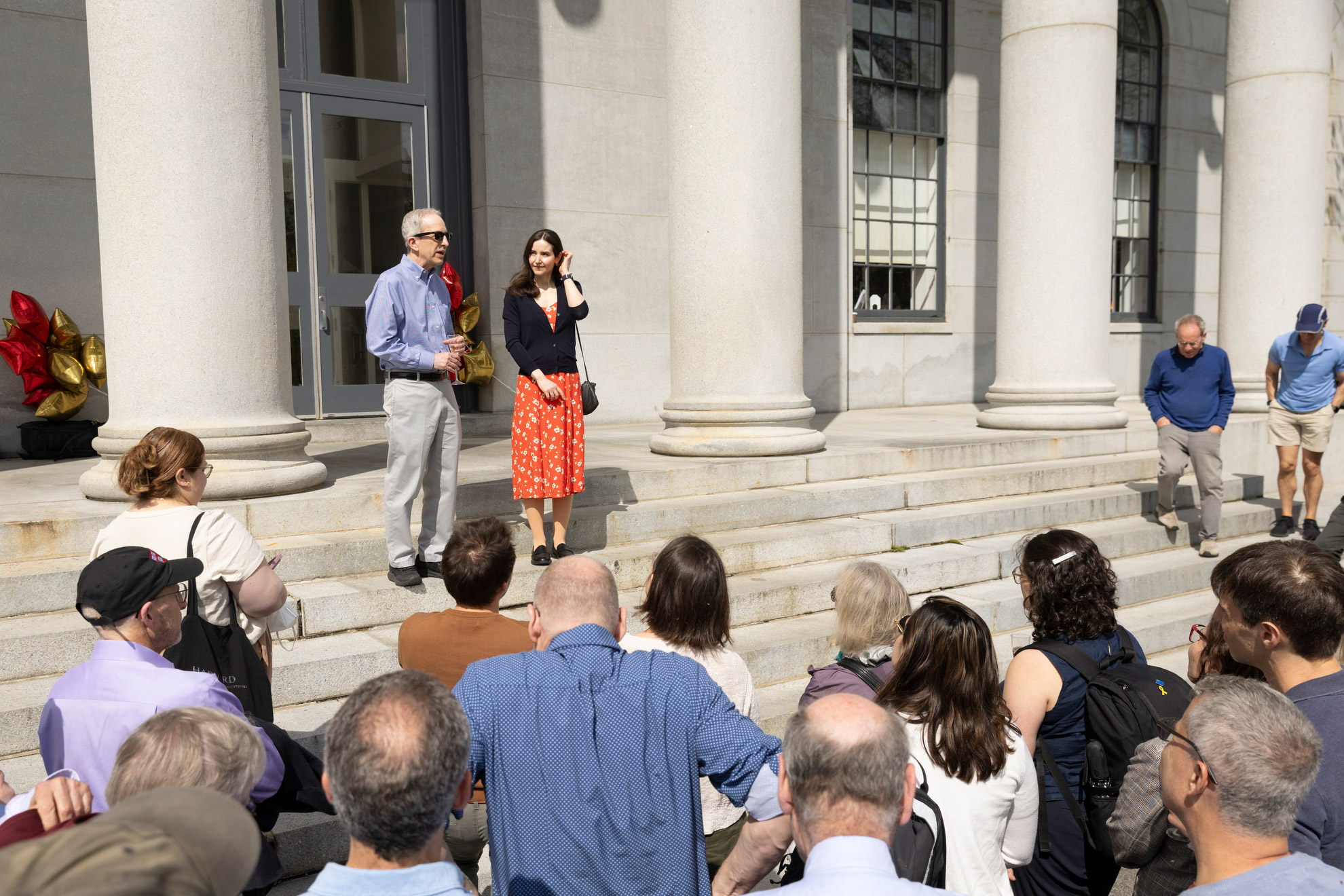Stefanie Stantcheva, a prominent Harvard economist, has recently been awarded the esteemed John Bates Clark Medal, honoring her groundbreaking contributions to the field of economics. Recognized as a leading under-40 economist, Stantcheva’s work delves into vital areas such as tax policy insights and the intricate relationship between innovation and economic behavior. Her research has reshaped our understanding of how tax policy can spur or stifle innovation, providing deep insights that are essential for policymakers. During her award celebration, she expressed her gratitude for this recognition, highlighting the profound impact of the tax system on the economy. Stantcheva’s dedication to exploring public finance issues solidifies her status as an influential figure in the economics community, making her a deserving recipient of this prestigious economics award.
In the realm of economic theory and practical public finance, few figures stand out as prominently as Stefanie Stantcheva. This distinguished winner of the John Bates Clark Medal exemplifies the innovations emerging from Harvard’s economics department, focusing on critical issues surrounding taxation and its effects on economic dynamics. Her research, which investigates the complex interplay between innovation and tax structures, resonates widely in discussions about economic development and efficiency. Stantcheva’s work not only enhances our comprehension of financial policies but also seeks to challenge conventional wisdom about how taxes can either facilitate or inhibit growth. Through her endeavors at the Social Economics Lab, she continues to explore the nuances of economic behavior, contributing to a richer dialogue about sustainability and societal progress.
Stefanie Stantcheva: A Trailblazer in Economics
Stefanie Stantcheva’s recent recognition as the recipient of the John Bates Clark Medal highlights her status as a leading economist under the age of 40. This prestigious award is not merely an accolade; it symbolizes her significant contributions to the field of economics, particularly in understanding tax policy and its profound effects on economic behavior. Stantcheva’s research shows a remarkable ability to navigate complex economic landscapes and offer innovative insights that help shape public finance discussions. As a Harvard economist, her influence extends beyond academia, impacting real-world policies that govern economic systems.
With her extensive work on taxation and innovation, Stantcheva has illuminated critical aspects of how tax policies can either incentivize or deter economic activities. Her 2022 paper, “Taxation and Innovation in the 20th Century,” provides compelling evidence of the elasticity of innovation in response to tax changes. This indicates that well-structured tax policies can encourage creativity and technological advancements, underscoring the integral role of economists like Stantcheva in guiding policymakers towards sustainable economic growth.
Understanding Tax Policy Insights through Stantcheva’s Research
Stantcheva’s research delves into the intricate relationship between tax policies and economic innovation, a critical area for modern economies striving for growth and competitiveness. Her findings suggest that higher taxes may diminish the quantity of innovations, although they do not necessarily impact the quality. This dichotomy poses important questions for policymakers: How can taxation be designed to maximize innovation while still generating necessary revenue? Stantcheva’s insights serve as a guide for governments aiming to create fiscal systems that foster economic dynamism.
Furthermore, Stantcheva emphasizes the importance of understanding how individuals perceive tax incentives and burdens. The Social Economics Lab, which she founded, is dedicated to exploring psychological factors influencing public attitudes toward economic policy. By integrating insights from various disciplines, her lab aims to better understand the interplay between emotions, perceptions, and economic behavior, ultimately contributing to more informed and effective policy design.
The Impact of Innovation on Economic Growth
Innovation is frequently heralded as the cornerstone of economic growth, and Stantcheva’s work provides crucial insights into this relationship. By examining how different tax structures influence the rate of innovation, her research underscores how fiscal policy can either fuel or hinder technological advancements. In an era marked by rapid technological change, understanding the levers of innovation becomes essential for policymakers and economists alike. Stantcheva’s research demonstrates that a nuanced approach to taxation can yield a more vibrant economic landscape.
Moreover, Stantcheva’s analysis offers a framework for assessing the long-term implications of various tax policies on innovation. Policymakers must weigh the immediate revenue benefits of higher taxes against the potential risks of stifling creativity and economic expansion. Through her rigorous empirical work, Stantcheva provides a roadmap for navigating these complexities, ensuring that the tax system can support sustained innovation and growth.
Celebrating Contributions to Public Finance
The John Bates Clark Medal awarded to Stefanie Stantcheva not only recognizes her achievements but symbolizes the broader contributions of economists to public finance discourse. By exploring major policy questions and providing data-driven insights, Stantcheva stands at the forefront of economic thought. Her impact is felt throughout the academic community, resonating with both peers and emerging economists who aspire to follow in her footsteps. This recognition serves as an inspiration for future generations of economists.
In a celebratory event hosted at Harvard, the excitement surrounding Stantcheva’s award highlighted the collective pride of her colleagues and students. Remarks from esteemed faculty, including Dean Hopi Hoekstra and Chair Elie Tamer, emphasized the significance of her work within the Harvard Economics Department. Her journey reflects the evolving landscape of economics, where the integration of innovative research and policy analysis is crucial for addressing contemporary challenges.
Exploring the Intersection of Emotions and Economic Policies
In addition to her significant contributions to tax policy, Stantcheva is pioneering work investigating the psychological dimensions of economic decision-making. The Social Economics Lab delves into how emotions influence public reception of various economic policies, a critical area for understanding voter attitudes and engagement with economic reform. As economic stability often hinges on public support for policy measures, her focus on emotional responses may uncover new pathways for effective communication and policy implementation.
By merging economic theory with behavioral insights, Stantcheva’s research endeavors could transform how policymakers craft their messages around tax policies and economic initiatives. As she continues to explore these connections, the potential for improving public understanding and acceptance of complex economic policies grows. Stantcheva’s work exemplifies the need for multidisciplinary approaches to tackle pressing economic issues in an increasingly interconnected world.
Navigating Global Economic Challenges
As economies worldwide face unprecedented challenges, Stantcheva’s insights into taxation and innovation become even more crucial. Her research provides a foundation for understanding how different countries can adapt their fiscal policies to not only stimulate growth but also to address issues like inequality and social mobility. The intersection of innovation and tax policy is particularly relevant as economies seek to recover from crises and rebuild sustainably.
The collaboration between economists like Stantcheva and policymakers will be essential in navigating the complex terrain of global economic recovery. By advocating for evidence-based policies that encourage innovation while addressing public concerns, her work can help forge a path toward more resilient economic systems. As she continues her research at the Social Economics Lab, the insights generated will undoubtedly play a critical role in shaping future discussions on economic policy and reform.
Educational Impact of Stantcheva’s Teaching
Beyond her research, Stefanie Stantcheva’s role as an educator significantly impacts the next generation of economists. Her approach to teaching emphasizes the importance of critical thinking and real-world application of economic theories, preparing students to tackle complex issues they will encounter in their careers. By integrating her research findings into the curriculum, she provides students with unique perspectives on contemporary economic challenges.
Stantcheva’s commitment to education fosters an environment where students can engage deeply with economic concepts and develop their analytical skills. This ethos not only contributes to individual student success but also cultivates a new wave of economists who are equipped to influence policy and practice in meaningful ways. As a Harvard professor, her influence extends far beyond the classroom, shaping the field of economics for years to come.
Stantcheva’s Vision for Future Economic Policy
Looking ahead, Stefanie Stantcheva’s vision for the future of economic policy revolves around integrating innovative research with collaborative approaches. She believes that economists must work alongside policymakers to create solutions that are not only based on empirical evidence but also resonate with the public. Her aim is to bridge the gap between theoretical research and practical application, ensuring that economic policies effectively address the needs of society.
By continuing her exploration of innovative topics at the Social Economics Lab, Stantcheva is poised to influence future research directions in economics. The focus on how social and emotional factors interplay with economic behavior will undoubtedly lead to richer, more holistic understandings of how policies can be crafted to maximize societal benefit. In doing so, she is setting a precedent for a new era of economist engagement in public policy formulation.
Significance of the John Bates Clark Medal in Economics
The John Bates Clark Medal is considered one of the most prestigious awards in the field of economics, signifying substantial contributions by young economists. Awarded by the American Economic Association, this medal not only honors individual excellence but also highlights the importance of nurturing young talent within the discipline. Recipients of this award, including Stefanie Stantcheva, are often seen as the future leaders who will shape economic thought and policy for years to come.
Stantcheva’s receipt of the Clark Medal is a testament to her significant achievements at such an early stage in her career. It underscores the relevance of her work in the broader context of economic research and public policy. As the economic landscape evolves, the insights provided by award-winning economists will play a crucial role in helping societies navigate challenges and leverage opportunities for growth and innovation.
Frequently Asked Questions
What makes Stefanie Stantcheva a prominent Harvard economist?
Stefanie Stantcheva, a Harvard economist, is renowned for her pioneering insights into tax policy, innovation, and behavior. She received the prestigious John Bates Clark Medal in 2025 for her significant contributions to public finance, which have reshaped understanding in these areas.
What were the key findings of Stefanie Stantcheva’s work on taxation and innovation?
In her 2022 paper, ‘Taxation and Innovation in the 20th Century,’ Stefanie Stantcheva and her co-authors discovered that tax policy changes significantly affect innovation, showing high elasticity in response to tax rates. While higher taxes can reduce the quantity of innovation, they do not significantly impact the quality of inventions.
How did receiving the John Bates Clark Medal impact Stefanie Stantcheva’s career?
Winning the John Bates Clark Medal in 2025 has further solidified Stefanie Stantcheva’s status as a leading economist at Harvard. This accolade recognizes her influential work on tax policy and innovation, encouraging her continued research and advocacy for effective economic policies.
What is the focus of the Social Economics Lab founded by Stefanie Stantcheva?
The Social Economics Lab, founded by Stefanie Stantcheva in 2018, focuses on understanding people’s perceptions of economic issues and policies. The lab explores various topics, including the interplay between emotions and economic policy, as well as societal mindsets affecting economic behavior.
What does Stefanie Stantcheva say about the impact of tax systems on economies?
Stefanie Stantcheva emphasizes that tax systems are powerful tools that can significantly affect economic health. Properly designed tax policies can encourage innovation and economic activity, while poorly designed taxes may stifle growth and discourage investment.
Who celebrated Stefanie Stantcheva upon receiving the John Bates Clark Medal?
Stefanie Stantcheva was celebrated by her colleagues and students at Harvard during a departmental event. Notable figures like Hopi Hoekstra, the Faculty Dean, and Elie Tamer, the Economics Department chair, praised her contributions to economics and acknowledged the honor of her receiving the John Bates Clark Medal.
| Key Point | Details |
|---|---|
| Award Won | Stefanie Stantcheva awarded the 2025 John Bates Clark Medal. |
| Significance of the Award | The medal honors significant contributions to the field of economics by economists under 40. |
| Research Focus | Stantcheva’s research includes tax policy, innovation, public finance, and economic behavior. |
| Key Findings | Higher taxes negatively impact the quantity of innovation, though not the quality, according to her 2022 paper. |
| Social Economics Lab | Founded by Stantcheva in 2018 to study economic issues through a social lens. |
| Future Research | Exploring the interplay between emotions and economic policies at her lab. |
Summary
Stefanie Stantcheva has made a remarkable impact in the field of economics, evidenced by her recent recognition with the 2025 John Bates Clark Medal. This prestigious award highlights her significant contributions to understanding tax policy, innovation, and economic behavior. Stantcheva’s pioneering research not only reveals how tax systems can influence economic activity, but it also sets the stage for future exploration into the emotional dimensions of economic policy. Her work continues to inspire and drive further insights in the realm of public finance, marking her as a prominent figure in modern economics.


